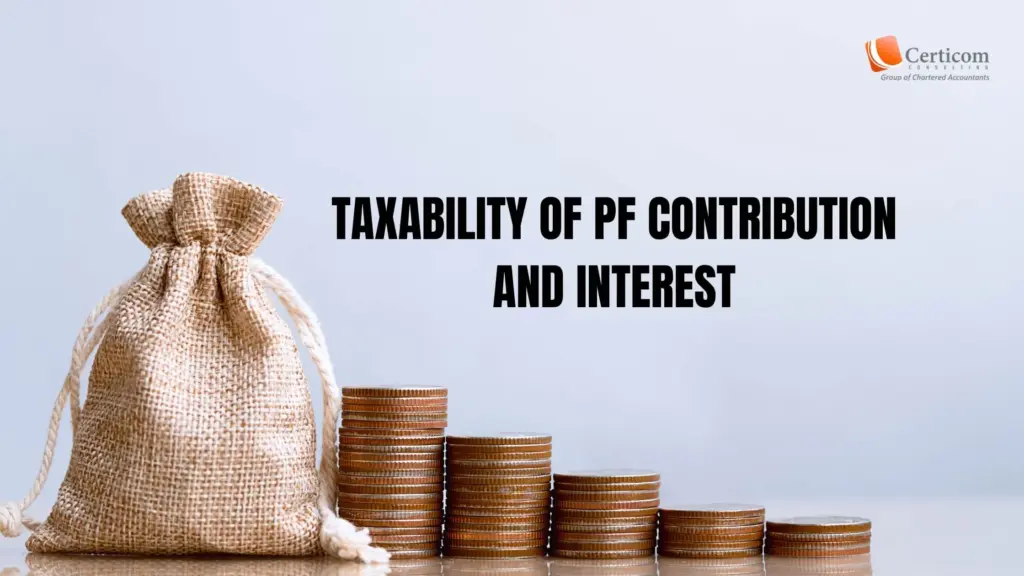TAXABILITY OF PF CONTRIBUTION AND INTEREST

PF Contribution and Interest Taxability
It is normally understood that the PF contribution and interest accrued on such contribution are tax-free. However, there are certain provisions of the Income-tax Act that specify a threshold limit above which the income will be taxable. Furthermore, the taxable portion is taxed under two heads, either under the head salary or other sources.
As per the provisions of the Income-tax Act, interest income earned/accrued at a rate of more than 9.5% on the balance amount of the provident fund account is liable to be taxed under the head salary. Furthermore, there have recently been certain amendments in the Income-tax Act affecting the taxability of the amount credited to the provident fund or income generated, i.e., interest income from such a fund. The changes are specific to employee contributions and employer contributions.

Taxability of Employee Contribution to PF
Starting from the financial year 2021-22, tax obligations are applicable on the interest income earned or accrued on employee contributions exceeding INR 2.5 lakhs. This means that if an employee’s contribution exceeds INR 2.5 lakhs in a year, the interest earned on the excess amount is subject to taxation. However, if the employer does not contribute to the Employee Provident Fund (EPF), the threshold is increased to INR 5 lakhs. It’s important to note that there is no change in the deduction limit under section 80C, which allows employees to claim deductions on their contributions up to INR 1.5 lakhs.
According to section 194A of the Income Tax Act, a tax deduction at source (TDS) of 10% will be applied to the taxable interest income accrued above the threshold limit during the year.
As per notification No. 95/2021 dated 31st August 2021, the Provident Fund (PF) department will maintain separate accounts for taxable contributions and non-taxable contributions for all subscribers from the financial year 2021-22 onwards. Taxpayers will be liable to pay tax on the interest accrued in the taxable contribution account, and the EPFO will deduct TDS on such interest.
Taxability of Employer Contribution to PF
From FY 2020-21 onwards, the employer’s contribution to the EPF account shall become taxable if the contribution to EPF, NPS, and/or superannuation fund exceeds Rs 7.5 lakhs in a financial year. The excess contribution will become taxable. The employer needs to calculate the amount that will be taxed as a prerequisite, and this will be reflected in the employee’s Form 16.
Moreover, any interest earned on the taxable portion of the employer’s contribution, i.e., interest earned on contributions of more than 7.5 lakhs, is taxable. Rule 3B has been introduced by the Income Tax department to ascertain how interest, dividends, etc., will be calculated on the above contribution. Employers also need to withhold tax on such accruals.
Based on the above, there are three scenarios under which PF contributions or interest/income credited over the same can be taxed. The following are such cases:
1. In case the rate of interest credited on the PF balance is more than 9.5%
2. In case the contribution from the employee is more than 2.5 lakhs, then the interest credited on such excess contribution.
3. In case the contribution from the employer is more than 7.5 lakhs, then the income credited from that contribution as computed under Rule 3B of the Income-tax Rules. Further, the employer contribution above 7.5 lakhs will also be taxed.

Example:
Mr. X, an employee contributed Rs. 10,00,000 for employee contribution to PF. The employer also contributed Rs. 10,00,000 to the PF as employer contribution. Further, the interest credited by the employer is @ 10%.
*The amount includes tax on account of 0.5% of interest credited above 9.5% and the taxable amount calculated as per Rule 3B of the Income-tax Rules.
Read More: A Comprehensive Guide: Precautions for Salaried Individuals Filing ITR
**TDS u/s 192 will be deducted at the time of payment, i.e., the credit of interest, and TDS u/s 194A will be deducted at the time of credit or payment, whichever is earlier.
Related Post
Loan Interest Deductions: How to Claim and Avoid Tax Scrutiny
NRI Tax Filing in India: A Guide to Rent, Capital Gains & Interest Income
Book A One To One Consultation Now For FREE
How can we help? *




